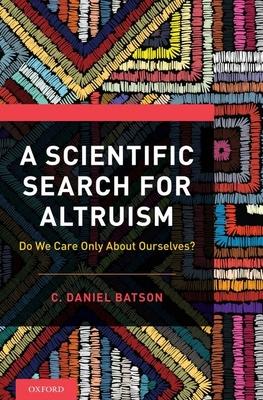For centuries, the egoism-altruism debate has echoed through Western thought. Egoism says that the motivation for everything we do, including our seemingly selfless acts of care for others, is to gain one or another self-benefit. Altruism, while not denying the force of self-interest, says that under certain circumstances we can care for others for their sakes, not our own. Over the past half-century, social psychologists have turned to laboratory experiments on humans to provide a scientific resolution of this debate about our nature. The experiments have focused on the possibility that empathic concern-other-oriented emotion elicited by and congruent with the perceived welfare of someone in need-produces altruistic motivation to remove that need.
With carefully constructed experimental designs, these scientists have tested the nature of the motivation produced by empathic concern, determining whether it is egoistic or altruistic and, thereby, providing an answer to a fundamental question about what makes us tick.
Framed as a detective story, this book traces the scientific search for altruism through numerous studies and attempts to examine various motivational suspects, reaching the improbable conclusion that empathy-induced altruism is indeed part of our nature. The book then considers the implications of this conclusion both for our understanding of who we are as humans (the bad news as well as the good) and for how we might create a more humane society.
| FindBook |
有 1 項符合
A Scientific Search for Altruism: Do We Only Care About Ourselves?的圖書 |
 |
A Scientific Search for Altruism: Do We Only Care about Ourselves? 作者:Batson 出版社:Oxford Univ Pr 出版日期:2018-11-19 語言:英文 規格:精裝 / 16.5 x 24.1 x 2.5 cm / 普通級 |
| 圖書館借閱 |
| 國家圖書館 | 全國圖書書目資訊網 | 國立公共資訊圖書館 | 電子書服務平台 | MetaCat 跨館整合查詢 |
| 臺北市立圖書館 | 新北市立圖書館 | 基隆市公共圖書館 | 桃園市立圖書館 | 新竹縣公共圖書館 |
| 苗栗縣立圖書館 | 臺中市立圖書館 | 彰化縣公共圖書館 | 南投縣文化局 | 雲林縣公共圖書館 |
| 嘉義縣圖書館 | 臺南市立圖書館 | 高雄市立圖書館 | 屏東縣公共圖書館 | 宜蘭縣公共圖書館 |
| 花蓮縣文化局 | 臺東縣文化處 |
|
|
圖書介紹 - 資料來源:博客來 評分:
圖書名稱:A Scientific Search for Altruism: Do We Only Care About Ourselves?
|











